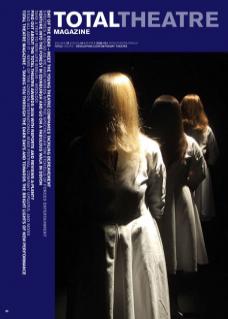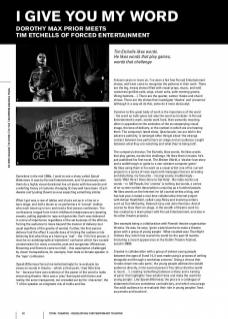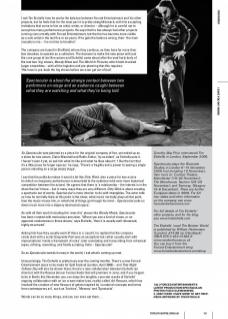Sometime in the mid 1990s, I went to see a show called Speak Bitterness. It was by Forced Entertainment, and I’d previously seen them do a highly visual durational live art piece with few words and a whirling frenzy of costume changing (it may well have been 12.am: Awake and Looking Down) so was expecting something similar.
What I got was a row of tables and chairs set up in a line on a bare stage, and half a dozen or so performers in ‘normal’ clothes who each stood up in turn and read a first-person confession. The confessions ranged from trivial childhood misdemeanours (stealing sweets, pulling pigtails) to rape and genocide. Each was delivered in a tone of importance regardless of the seriousness of the offence, forcing the audience to move beyond the manner of delivery (our usual signifiers of the gravity of words). Further, the first-person delivery had the effect it usually does of tricking the audience into believing that what they are hearing is ‘real’ – the ‘if it’s first person, it must be an autobiographical statement’ confusion which has caused consternation for many a novelist, poet and songwriter (Winterson, Browning and Eminem come to mind) – this assumption challenged by clever transpositions, for example, from male to female speaker in the ‘rape’ confession.
Speak Bitterness forced me (entertainingly) to re-evaluate my views on words in theatre – which at that point, I had little time for – because here was evidence of the power of the word to make entrancing theatre. Here was a ‘play’ that toyed with fiction and reality, the actor transparent, not crowded out by the ‘character’; the ‘I’ of the speaker an enigmatic mix of truths and lies.
A dozen years or more on, I’ve seen a fair few Forced Entertainment shows, and have come to recognise the patterns in their work. There are the big, messy shows filled with visual props, music, and wild costumes (gorillas suits, wigs, clown suits, satin evening gowns, Viking helmets…). There are the quieter, calmer ‘desks and chairs’ shows. There are the shows that investigate ‘theatre’ and ‘presence’ (although in a way all do this, some do it more obviously).
Common to this great body of work is the importance of the word – the word as truth-giver, but also the word as trickster. In Forced Entertainment’s work, words work hard, their semantic meaning often in opposition to the semiotics of the accompanying visual image, the tone of delivery, or the context in which we are hearing them. The company’s latest show, Spectacular, we are told in the advance publicity, is (amongst other things) about ‘the strange contact between two performers on-stage and an audience caught between what they are watching and what they’re being told’.
The company’s director, Tim Etchells, likes words. He likes words that play games, words that challenge. He likes them in books: he’s just published his first novel, The Broken World, a ‘slacker love story and a walkthrough or guide to a non-existent computer game’. He likes using them in his work as a visual artist: one of his current projects is a series of neon signs with messages that are arresting and disturbing: my favourite – incongruously, maddeningly – reads ‘Wait Here I Have Gone to Get Help’. His video works use words – in 100 People, the ‘cinema’ is nothing but words, a series of on-screen written descriptions conjuring up a hundred people. He likes words on the Internet: he (of course) writes a blog, and has last year created a real-time collaborative Internet project with Adrian Heathfield, called Long Relay and involving writers such as Tom McCarthy, Deborah Levy and John Harrison. And of course he likes them on-stage, in the wealth of theatre work he has created as a team player with Forced Entertainment, and also in his other theatre projects.
One example being a collaboration with Flemish theatre organisation Victoria. He was, he says, ‘given carte blanche to make a theatre piece with a group of young people’. What resulted was That Night Follows Day, which has toured the world for the past 18 months (including a recent appearance at the Dublin Theatre Festival, autumn 2008).
Created in collaboration with a group of sixteen young people between the ages of 8 and 14, it was made using‘a process of writing alongside and through a workshop process’. Using a chorus that ‘breaks down into solo parts’, the young people address the (adult) audience directly, in the second person (‘You tell us that the world is round…’), creating ‘something between a litany and a naming of parts’ that highlights ‘how adults frame and make the world for young people’. Like Speak Bitterness, the piece is a catalogue of statements that are sometimes contradictory, and which encourage ‘the adult audience to re-evaluate their role in young peoples’ lives as parents and teachers’.
I ask Tim Etchells how he works the balance between Forced Entertainment and his other projects, but he feels that for the most part it is pretty straightforward, with him accepting invitations that come to him as artist, writer, or director – although he is careful not to accept too many performance projects. He says that he has always had other projects running concurrently with Forced Entertainment, but that he has become more visible as a solo artist in the last five or six years. If he gets the balance wrong, then: ‘the main casualty is me – I’ve no time to breathe!’.
The company are based in Sheffield, where they continue, as they have for more than two decades, to operate as a collective. The decision to make the new piece with just the core group of six (five actors and Etchells) came about after the mad hurly burly of the last two ‘big’ shows, Bloody Mess and The World In Pictures, which both involved larger ensembles – with all the logistics and pre-planning that this requires: ‘We have to pre-book the big shows before we even get out of bed’.
So Spectacular was planned as a piece for the original company of five, yet ended up as a show for two actors, Claire Marshall and Robin Arthur, ‘by accident’, as Etchells puts it. I haven’t seen it yet, so ask him what its like and what he likes about it: ‘I like the fact that it’s a little piece for larger spaces,’ he says, ‘There’s a fragility and a power to seeing a single person standing on a large empty stage’.
I say that the publicity makes it sound a bit like Dirty Work, also a piece for two actors (in which an imaginary performance is described to the audience with ever-more hysterical competition between the actors). He agrees that there is ‘a relationship – the interest is in the show that isn’t there – but in many ways they are very different. Dirty Work is about creating a spectacle out of words. Spectacular is more interior; to do with intangibles. The actor tells us how he normally feels at this point in the show, what music normally plays at that point, how the music moves him, or what kind of things go through his mind – Spectacular pulls us down much more into a slippery abstracted space’.
As with all their work (including the ‘anarchic’ pieces like Bloody Mess), Spectacular has been created with meticulous precision. ‘Where you see a kind of chaos, or an apparent randomness in these shows,’ says Etchells, ‘then it is usually well rehearsed, highly structured’.
Asking him how they usually work (if there is a ‘usual’), he replies that the company rarely start with a script (Exquisite Pain was an exception) but rather usually start with improvisations ‘inside a framework of rules’, later annotating and transcribing from rehearsal tapes, refining, reworking, and finally scripting. Voila – Spectacular!
So as Spectacular wends its way in the world, I ask what’s coming up next.
Unsurprisingly, Tim Etchells is pretty busy over the coming months. There’s a new Forced Entertainment piece to be made for Spill Festival (London, April 2009) – and That Night Follows Day will also be shown there; there’s a new collaboration between Etchells (as director) with the Roasas dancer Fumiyo Ikeda that will premiere in June; and if you happen to be in Berlin this November you can enjoy the tangible, concrete results of Etchells’ ongoing collaboration with an ice cream maker (yes, really) called Art Flavours, which has involved the creation of new flavours of gelato inspired by ‘curatorial concepts and terms from contemporary art’, such as ‘Archive’, ‘Memory’ and ‘Spectacle’.
Words can be so many things, and you can even eat them…
Dorothy Max Prior interviewed Tim Etchells in London, September 2008.
Spectacular plays the Riverside Studios in London 6–15 November 2008 (not including 10 November), then tours to: Contact Theatre, Manchester (18–22 November); The Brewhouse, Taunton (28–29 November); and Tramway, Glasgow (4–6 December). There are further European dates in 2009. For full tour dates and other information on the company see www. forcedentertainment.com
For full details of Tim Etchells’ other projects, and for his blog, see www.timetchells.com
Tim Etchells’ novel The Broken World is published by William Heinemann (London) £14.99 rrp (Hardback) ISBN 978 0 434 01833 8 www.randomhouse.co.uk You can buy it from the Forced Entertainment shop www.forcedentertainment.com/shop


